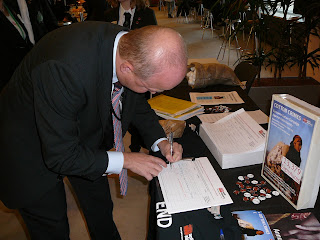With a current total of 13, 379 signatures for the Cotton Crimes Petition so far and still counting, Anti-Slavery International and five Students from Bishop Bell School in Eastbourne presented the petition to George Cutas MEP on the 7th December at the European Parliament in Brussels. Accepting the petition on behalf of the International Trade Committee, George Cutas said he will be presenting it to the European Parliament next week. The petition requests the removal of Uzbekistan’s preferential trade tariffs in light of the ongoing use of state-sponsored child slavery in the country’s cotton industry.
Mr George-Sabin Cutas MEP said:
“I congratulate the students as I think this is a really important issue. I am impressed by their effort to come to the European Parliament and speak out for children in Uzbekistan who are forced to pick cotton.”
 |
| Catherine Bearder and Bishop Bell School students presenting the petition to George Cutas |
Jasmine Down age 14 said:
“When I heard that children, sometimes as young as 5, are working in the cotton fields for 3 months a year, I was outraged. I believe these children should have a choice in whether they work in the cotton fields and that they shouldn’t get punished for not picking good quality or not enough cotton.”
“The act I would like the European Parliament to do about this issue is to stop child labour and give these children an education.”
“Today has been the best experience of my life and I have met loads of different people and learnt a great deal of things.”
 |
| Bishop Bell School students at the European Union | | |
|
Isaac Nuckhir, age 14 also said:
“Once I found out what was happening in Uzbekistan, I immediately thought that it was unfair on these children. The fact they don’t even have the choice of education or work, it makes me think that I and others take things for granted and I’m thankful for my education.”
“I feel the European Parliament could put a stop to child labour and give children the same education as me.”
“I think it was a very good and interesting day overall. The MEPs who signed the petition were very respectful. I enjoyed myself and it was a good laugh.”
Their presence was well received by the MEPs who visited our stand. Over 19 in total signed our petition, took photos and talked with the students. We would like to extend our sincere thanks to Catherine Bearder MEP who sponsored our visit and helped make this trip possible as well as the students from Bishop Bell School and everyone who signed the petition.
 |
| Michael Theurer |
Catherine Bearder MEP said:
“I’m delighted that the children have been learning about this issue and where the things they buy come from. When I’m working in Parliament I want to be representing the views of my constituents which is why I’m so pleased they are here today. It’s been an early start which just shows their commitment.”
 |
| Bishop Bell School with Gemma Wolfes and Joanna Ewart-James from Anti-Slavery |
Next week the EU Parliament will be voting on a trade deal that would make it easier for Uzbekistan to export textiles to Europe. The Foreign Affairs and Trade Committee have already voted against this. If the EU votes against this it would be a very positive step towards getting the EU to take greater action against child-slavery in Uzbekistan.
Thank you to everyone who has supported our campaign. We need to continue to pressure Uzbekistan via the EU to ensure child slavery in the country ends once and for all, so please watch this space for how you can keep supporting us.
You can see more pictures of the petition delivery on our facebook page.
Thank you!
